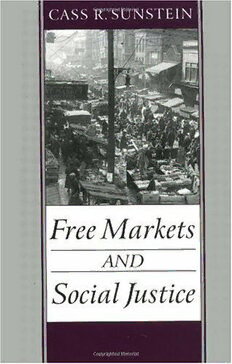
Free Markets and Social Justice PDF
438 Pages·1999·3.774 MB·English
Most books are stored in the elastic cloud where traffic is expensive. For this reason, we have a limit on daily download.
Preview Free Markets and Social Justice
Description:
The newest work from one of the most preeminent voices writing in the legal/political arena today, this important book presents a new conception of the relationship between free markets and social justice. The work begins with foundations--the appropriate role of existing "preferences," the importance of social norms, the question whether human goods are commensurable, and issues of distributional equity. Continuing with rights, the work shows that markets have only a partial but instrumental role in the protection of rights. The book concludes with a discussion on regulation, developing approaches that would promote both economic and democratic goals, especially in the context of risks to life and health.Free Markets and Social Justice develops seven basic themes during its discussion: the myth of laissez-faire; preference formation and social norms; the contextual character of choice; the importance of fair distribution; the diversity of human goods; how law can shape preferences; and the puzzles of human rationality. As the latest word from an internationally-renowned writer, this work will raise a number of important questions about economic analysis of law in its conventional form.
See more
The list of books you might like
Most books are stored in the elastic cloud where traffic is expensive. For this reason, we have a limit on daily download.
